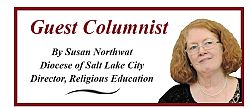Not All Lay Ministers are Lay Ecclesial Ministers
Friday, Feb. 19, 2016
Monsignor M. Francis Mannion’s column in the Jan. 29 Intermountain Catholic posed the excellent question: Are not all lay ministers lay ecclesial ministers?
Many Catholics are unfamiliar with the term” lay ecclesial minister,” and some assume it is simply a synonym for lay minister. However, just as the designations of transitional deacon/permanent deacon or diocesan priest /religious priest convey distinct understandings, differences also exist in these two lay vocational calls, and clarity is needed.
Initially, “lay ecclesial minister” was used to describe a rapidly increasing numbers of men and women who, discerning vocational calls, presented themselves to serve the Church. The term came into common usage after the release of Called and Gifted for the Third Millennium (USCCB, 1995). These lay men and women sought formation opportunities to prepare themselves for professional ministry, and many dioceses, institutes and colleges noted a growing demand for responsive educational services. Most of the early LEMs served as leaders within religious education, youth ministry and liturgy, plus a newly emerging category of parish pastoral associates.
In 1995, CARA counted 10,764 lay ecclesial ministers serving in dioceses in the United States. With continued rapid growth, the U.S. Conference of Catholic Bishops began to study this movement and issued Co-Workers in the Vineyard of the Lord (2005). It remains the foundational document for guiding development of lay ecclesial ministry. Today LEMs number over 39,600, with some 22,000 individuals preparing for this relatively new category of service.
The Catechism of the Catholic Church describes lay ministers as members of the faithful who are called “to illuminate and order all temporal things with which they are closely associated that these may always be effected and grow according to Christ.” Over time, many lay ministers were blessed with pastors who called forth their gifts and talents and offered occasional opportunities for training and study. But this definition does not address discernment, formation, assessment or supervised practice characteristic of lay ecclesial ministry. The distinctions between lay minister and lay ecclesial minister within each diocese arise from the manner in which the diocesan bishop structures preparation for ministry and authorizes laity for service.
Based upon Co-Workers, the Diocese of Salt Lake City began a LEM formation program in 2006. Formation for this ministry requires four years in a structured program plus continual study and updating. Selected candidates enter into personal and communal prayer, spiritual direction and mentoring. This is not an individual study program. Activities take place within an intentional community of people who are discerning their vocational calls. The curriculum includes classes offered by guest lecturers from the Congar Institute, and other presenters who augment online theology classes offered through the Institute for Church Life at the University of Notre Dame. Candidates are assessed in their progress and must meet certification standards established by the National Association for Lay Ministry or other national organizations. The years of ministerial preparation culminate in a public Mass and commissioning for pastoral ministry offered by the bishop and witnessed by the people of God.
Msgr. Mannion strongly advocates the need to recognize dedicated service of the faithful lay ministers who have long served the Church. This affirmation could be a wonderful way to encourage more lay vocations and he is correct in asserting that ”there needs to be further clarity on these matters.”
For questions, comments or to report inaccuracies on the website, please CLICK HERE.
© Copyright 2024 The Diocese of Salt Lake City. All rights reserved.
© Copyright 2024 The Diocese of Salt Lake City. All rights reserved.


Stay Connected With Us